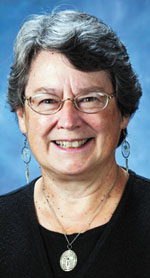By Corrine Winter
In the past months, this column has addressed the Catholic Intellectual Tradition as including both specific works that are considered classics and a way of thinking. This month, I want to reflect on CIT as characterized by a commitment to community. In the earliest centuries of Christianity, St. Irenaeus of Lyons wrote against a group who considered themselves privileged to know truths that had been revealed to only a few and were not available to “ordinary” Christians. Their special insights, they thought, made them a spiritual elite. Against those suppositions, Irenaeus insisted that the truth had been preached in public and handed down in Scriptures so that it was available to all who sought it. He spoke of a “rule of faith” acknowledged within the Church and of communion with the Church at Rome as a sign of true faith. Truth was for communion; it should be hoped that all would recognize the truth and so come to recognize God in Jesus Christ.

Catholic Intellectual Tradition continues the commitment to community — oriented rather than individualistic pursuit of truth. Knowledge, like the goods of the earth, is meant for sharing and not primarily for individual prestige or elitism. The founding of universities beginning in the Middle Ages promoted dialogue among scholars of diverse disciplines. Scholars engaged one another in spirited public disputes during which they honed their own and others’ intellectual skills. Theologians sought to provide systematic presentations of the faith that would be accessible to scholars in other fields as well as to other theologians.
Bishop John McMullen, founder of St. Ambrose University in Davenport, saw a need for educated and faith-filled Catholics among both laity and clergy who could and would support one another in proclaiming the truth by both word and deed. The Second Vatican Council described the Church as a sign and instrument of the truth intended to enlighten all peoples and called for discernment to mark the development of cultures so that all development, all use of human reason and ingenuity would be directed toward true human flourishing marked by respect for the dignity of every person and by the pursuit of the common good.
This era of global connectivity and rapidly increasing knowledge calls us with renewed urgency to a sense of communal responsibility in our intellectual activities. We have the capacity to develop so many new technologies that corporations vie with one another to convince us that they have come up with the latest and the best — the things that will brighten our present and build a better future. But for whom and in what way? To what extent will our work benefit all? Might some flourish at the expense of others? Commitment to community also means respect for diverse cultural expressions and methods of research. Catholicism as universality implies that we recognize our need to learn from one another; while I may certainly challenge someone whose ideas differ from mine, I do so with a certain humility. The Church, of course, has struggled and continues to struggle with how best to live by this principle of dialogue over condemnation especially when different perspectives are seen as a threat to the unity of the Church.
Another aspect of the call to work for the common good is found within the just war tradition. That tradition requires that above all, I not dehumanize my opponents but acknowledge their fundamental human dignity and even their belief in the justice of their cause (even while I may see their cause as opposed to human dignity). While I may be convinced that a certain idea needs correction or a certain course of action must be halted for the sake of the common good, my hope must be peace among all peoples and not the destruction of any group as people.
It is not uncommon to distinguish between knowledge and wisdom. The distinction is made in diverse ways, but one that seems practical to me would suggest that wisdom includes the ability to discern what kinds of knowledge we should pursue and how we can best put our knowledge to work for the good of all. We have many reasons today to pray for such wisdom.
(Corinne Winter is a professor of theology at St. Ambrose University in Davenport.)








